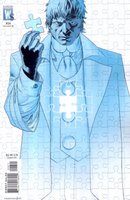 I came to Planetary late in the game. I had heard about it, certainly, but it wasn't until issue #14 or 15 was out that I started hearing people who's opinion I trusted really start raving about it. I picked up the first two trades, and was absolutely floored. Not only was it an excellent comic series in and of itself, but the sub-texts were impressive as well. Commentary on the fictional characters I grew up with, and simultaneous commentary on the comic medium and industry as a whole. Metaphors and anagrams abound in the series for those who wished to see them, but the story itself was still amazingly solid and well put-together at more superficial levels if the reader had no interest in really delving into the material.
I came to Planetary late in the game. I had heard about it, certainly, but it wasn't until issue #14 or 15 was out that I started hearing people who's opinion I trusted really start raving about it. I picked up the first two trades, and was absolutely floored. Not only was it an excellent comic series in and of itself, but the sub-texts were impressive as well. Commentary on the fictional characters I grew up with, and simultaneous commentary on the comic medium and industry as a whole. Metaphors and anagrams abound in the series for those who wished to see them, but the story itself was still amazingly solid and well put-together at more superficial levels if the reader had no interest in really delving into the material.In reading the series, I make a point of avoiding any material about the issue until after I've read it. With most books, I'm not overly concerned about previews and minor spoilers, but Planetary is my ongoing test of literature, cultural, narrative structure, storytelling. I sit down to read Planetary, make up my own mind about each issue with no preconceived bias, and try to decipher the themes, analogies, and foreshadowing for myself. Only afterwards do I start to look for confirmation of my thoughts and/or elements I overlooked. Each issue has been thought-provoking on several levels, and it's one of the primary reasons I enjoy it.
A week ago Wednesday, Planetary #26 was released and I just had a chance to read it. The superficial plot of the series was, by and large, resolved leaving only an epilogue or a coda for #27, which Warren Ellis has stated will be the final issue. The story was summed up neatly and concisely, without the need for a slugfest that typifies so many comic book stories. Indeed, not one punch is thrown in the issue. But in the end, Elijah Snow destroys what's left of The Four and promises that the real work is just starting.
Personally, I pulled out some interesting quotes from the issue that I, at least, attach a deeper meaning than may be readily apparent. In dealing with Professor Dowling, Snow says:
... I won't stand in your way when your alternate-universe partners come to collect. In the long run, you see, none of that matters. I've seen Heaven, Dowling. And it's not a place where you exercise any power. In the long run, we are all three-dimensional side-effects of a two-dimensional universe existing in a multidimensional stack.Ellis seems to be saying, through Snow, that all of the big super hero comics that are popular in the industry are ultimately meaningless. He has no intention of forcing fans to stop collecting the stacks of super hero books. As entertaining as they may be, they don't really say anything significant; they don't hold any real information; they don't have any power. At the end of the day, they're just fictions to which fans ascribe three-dimensional properties.
Shortly after that conversation, Snow talks to his companions...
Everything we've learned about him says that he wants to be a big man, and that he'll destroy anything that makes him look small... He had to sell out the planet Earth to gain what the likes of us were born with.Seems to me to be a shot at Marvel and DC's (and probably any other publisher's) perpetual licensing of what are essentially archetypes. And the population at large can't recognize that because they do such a good job at smashing the competition.
Then, after finally defeating The Four, Jim Wilder sums up the current situation to Snow...
Look around, Mr. Snow. A crew of superhuman ancestors of the City Zero survivors, saved by you and Miss Hark to pilot a sailing ship of the multiverse itself.Why bother create new heroes over and over again? We've got a plethora of existing ones to work with that all have rich histories and still plenty of potential in every genre that we know about.
And in Snow's final monologue...
It's just starting. The real work. We have so much to show people, now. And so much more to sift from the ground.There is a lot of great material already out, but no one knows about it. We need to work to bring all these great characters back to the masses, and introduce them around the world.
Now, that's MY reading. It's probably colored in no small part by the Propaganda of the Deed story I've got rolling around in my head. But isn't that a large part of ANY piece of art? The viewer's interpretation. Planetary is only significant insomuch as I make it significant for myself. It's only relevant if I make it relevant. If I had never picked up the series, it would have almost no impact on my life. Certainly no direct impact.
I used to think Ellis was over-hyped and I choose to largely ignore his work. But I see now why he has such a devoted following, and I'm definitely going to have to start searching the back issue bins for his work.






0 comments:
Post a Comment